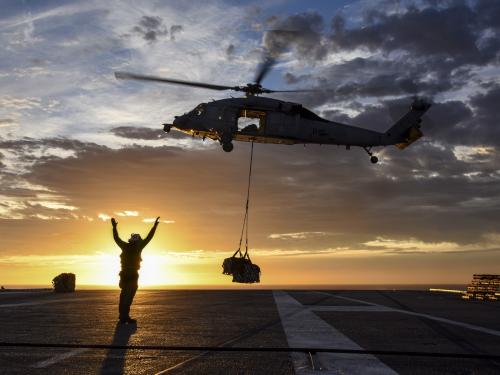
This fist-sized exit wound
on the inside of the man’s thigh
a foot above the knee
bleeds surprisingly little.
Had the bullet split the artery—
thick black line pulsing deep in the wound—
the man would already be dead but
now Doc Guerrero fingers gauze into the hole
and the man screams and seizes
my arm and doesn’t let go
even after Guerrero finishes splinting the leg.
An older Iraqi sitting
zip-tied and blindfolded
next to a Humvee tire lifts his head
when the wounded man stops screaming.
Soldiers not on the perimeter
gather to hear Bateman explain how
the men, likely looters scouting
the abandoned ammo bunkers,
had been surprised by Bateman’s patrol
and tried to run on their motorcycles.
After warning shots
to stop the men from fleeing,
Bateman said he aimed center mass
and pulled the trigger.
“Dumb-ass haji’s just lucky
you’re such a piss-poor shot,”
someone says and we laugh.
The wounded man,
who’s been chattering in Arabic
since Doc and I arrived,
asks for a translator—
Mutergem? Mutergem?—
one of the few Arabic words I know,
and I shake my head.
“We don’t have one. La mutergem.”
With crude hand signals
I try to make him understand
helicopter and hospital
but he shakes his head and asks
again. Mutergem?
When he sees the medevac helicopter
swing around to land facing the wind
he grabs my hand with both of his.
I feel self-conscious
about holding hands with this man.
Tears run into his ears.
I try to free myself from his grip
saying You’ll be fine. You’ll be fine
and he is talking directly to me in Arabic
and I say You gotta let go man
You’ll be fine
and he won’t let go
and when we slide his stretcher
into the Black Hawk
I have to free my hand
from his grip finger by finger
so I can get off the bird and back away
enough for the chopper to leave.
Through the dustoff
I see him reaching down.
